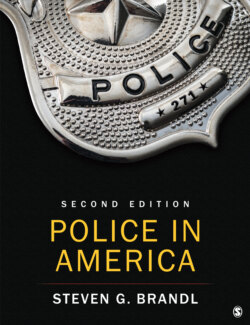Читать книгу Police in America - Steven G. Brandl - Страница 48
На сайте Литреса книга снята с продажи.
Constables and the Watch
ОглавлениеIn the early days of colonial America, there was little need for law enforcement. The colonists were God-fearing, hard-working people who took responsibility for their own actions and the actions of their neighbors. As settlements turned into towns, constables were the first appointed law enforcement officers. The duties of the constable varied depending on the size of the community, but generally the post was responsible for dealing with everything from stray cattle and dogs to misbehaving children. In some towns constables even enforced church attendance.2
constable: The first appointed law enforcement officers in colonial America. They often organized and supervised the watch.
In larger villages, constables were responsible for organizing and supervising the watch. The watch consisted of men who would watch the town, especially at night. Looking out for fires was a major responsibility of the watch since fires had the potential to destroy entire villages. The watch was also responsible for being on the lookout for suspicious persons. In the 1630s, Boston formed a watch that consisted of one constable and six watchmen.3 In other towns, the watch assignment rotated among the men in the village. At first, men who worked on the watch were unpaid volunteers; later they were paid, but the pay was minimal. Members of the watch patrolled on foot. When necessary, members of the watch could summon the other men in the village with what was known as the hue and cry. Whistles and wooden clappers or rattles were also used to alert townspeople of danger and to summon assistance.
watch: Men in larger villages in colonial America who were tasked with guarding the town, especially at night.
A Question to Consider 2.1 Reflections of the Watch in Policing Today
Do you see any similarities or parallels between the watch in colonial America and policing today? Explain your answer.
